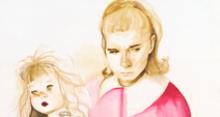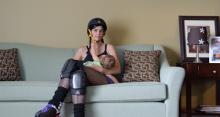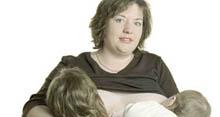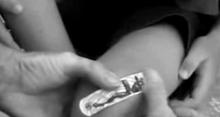BirthMarkings
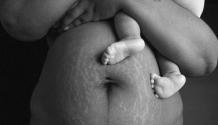
The idea for this project began percolating in my mind when I learned that the fastest growing plastic surgery for women was the post-birth tummy tuck. I started to think about what it means that we want to erase the signs of something so important and profoundly creative as giving birth. I wanted to explore this with women of different ages, backgrounds and experiences. "BirthMarkings" is a result of this exploration. I saw that so many of us internalized negative messages about our post-birth bodies, but that images of the passage of time, and the impact of physical forces on earth, trees, sand, stone and in space could be seen as beautiful. I wanted to reframe the image of the post birth body in this way. When I talked about this project I was overwhelmed by the number of women who offered to show me their stretch marks and scars and wanted to be part of this film. One of the biggest challenges was to select only some of their stories. Through the making and the showing of this film at festivals and in public spaces, I am continually reminded about how powerfully women are affected by the commodification of our bodies and how important it is to relate what happens to our bodies after we create life to the beauty of the natural world.
Camera/Editor Sarah Ledoux, Producer/Editor Renner Wunderlich
Margaret Lazarus is an author and documentary filmmaker. With her partner, Renner Wunderlich, she has produced and directed over 20 films including: the Academy Award winning, "Defending Our Lives”; the groundbreaking "Rape Culture" and twenty five years later, its award winning update "Rape Is"; the original "Killing Us Softly" and "Still Killing Us Softly" which were two of the most widely used documentaries in academia; festival award winners "Strong at the Broken Places," "The Strength to Resist," "Pink Triangles," "The Last Empire," "Eugene Debs and the American Movement," "Life's Work," "Not Just A Job," "Taking Our Bodies Back," and others. She created the UN General Assembly film presentation "Women's Rights: Human Rights." For several years she was a senior lecturer at Tufts University teaching Producing Film for Social Change. She is a coauthor of the chapters on violence against women in the many editions. Learn more at www.cambridgedocumentaryfilms.org
Related Content
|
Catherine Haley Epstein’s paintings touch on the many ways women’s identities shift and change when they become mothers. |
Kate Wilhelm uses roller derby to examine how real women contradict traditional gender codes in their identities as women and mothers. |
In her series of stark, simple images of women breastfeeding their children, Clare Yow invites us to rethink public breastfeeding. |
This short film illuminates the economic value of mothers’ work and the need for policies in the U.S. to effect life/work balance for mothers. |
